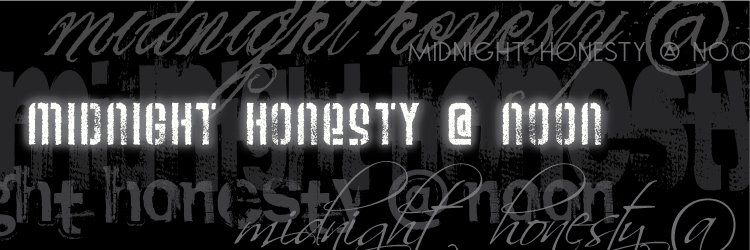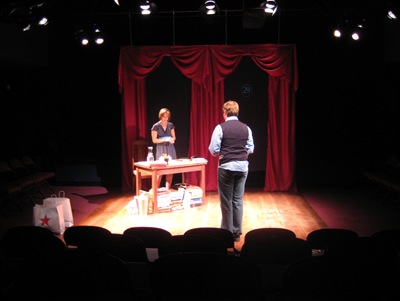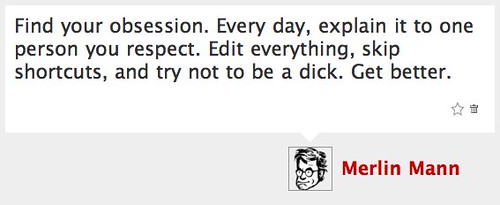Brendan Kiley fills a slow week with a top ten list just like a blogger, except of course he has the weight of The Stranger’s masthead behind him.
He assumes that theatre producers are swimming in money and are just afraid of using it to entertain him fully. He also manages to mishmash the problems of shoestring indie theatre and The Regionals as though they were the same set of problems with the same remedies. He also assumes that The Audience wants all the same things he does.
Man I hate that crap.
But he’s a pretty smart guy, isn’t 100% wrong, and deserves a rebuttal not a brush-off, and definitely not the weird “here’s a link go read this” ole the theatrosphere seems to have given it, (except for Dennis Baker).
1. Enough with the goddamned Shakespeare already. The greatest playwright in history has become your enabler and your crutch, the man you call when you're timid and out of ideas. It's time for a five-year moratorium—no more high schoolers pecking at Romeo and Juliet, no more NEA funding for Shakespeare in the heartland, and no more fringe companies trying to ennoble themselves with Hamlet. (Or with anything. Fringe theater shouldn't be in the game of ennobling, it should be in the game of debasement.) Stretch yourself. Live a little. Find new, good, weird plays nobody has heard of. Teach your audiences to want surprises, not pacifiers.
I feel for him. The number of Shakespeare, and BAD Shakespeare, that any professional/semi-professional theatregoer has to endure must be terrible. The thing is? That’s not true of the audience, and Shakespeare gives the producing company both room to play and a built in Audience. Also? Free to produce. I don’t begrudge Steven Dietz the money I owe him for producing his play, I love it and he’s earned it, but I sure could use that money elsewhere.
Also? It’s not Brendan Kiley’s job to tell me what my job is. If I choose to ennoble myself or my audience that IS my job. Not every show needs to be Blasted, indeed Blasted would lose its impact if they were.
2. Tell us something we don't know. Every play in your season should be a premiere—a world premiere, an American premiere, or at least a regional premiere. Everybody has to help. Directors: Find a new play to help develop in the next 12 months. Actors: Ditto. Playwrights: Quit developing your plays into the ground with workshop after workshop after workshop—get them out there. Critics: Reward theaters that risk new work by making a special effort to review them. Unions, especially Actors' Equity: You are a problem. Fringe theaters are the research-and-development wing of the theater world, the place where new work happens—but most of them can't afford to go union, so union actors are stuck in the regional theaters, which are skittish about new work and early-career playwrights. You must break this deadlock by giving a pass to union actors to work in nonunion houses, if they are working on new plays.
This is the moment where I question Whether Kiley has ever attempted to produce a show… I assume he has, but if you are even attempting Good Old Unsubsidized theatre and you don’t already have a brand name to trade off of, premieres are death. Runs are too short, and press is too spotty to get it where it needs to be. This is exactly how you never produce another show.
Actors have no say.
And the poor playwrights. Has he TALKED to a playwright? I mean can you talk to a playwright about development without them breaking into hives and/or foaming at the mouth? This is on the producers honestly, and see point one.
3. Produce dirty, fast, and often. Fringe theaters: Recall that 20 years ago, in 1988, a fringe company called Annex produced 27 plays, 16 of them world premieres—and hang your heads in shame. This season, Annex will produce 10 plays, 4 of them world premieres, which is still pretty good. Washington Ensemble Theatre will only produce three plays, one of them a world premiere. (An adaptation of... Shakespeare!) What else happened in 1988? Nirvana began recording Bleach—and played a concert at Annex Theatre. By the next year, Nirvana was on their first world tour. The lesson: Produce enough new plays and Kurt Cobain will come back from the grave and play your theater.
Um. There are two of us and no trust fund. I don’t think he’s wrong per se, producing a ton means that you build a brand name. But the resources needed to get this done are – well it’s mind boggling.
4. Get them young. Seattle playwright Paul Mullin said it best in an e-mail last week: "Bring in people under 60. Do whatever it takes. If you have to break your theater to get young butts in seats, then do it. Because if you don't, your theater's already broke—the snapping sound just hasn't reached your ears yet."
This is true, and I think the Fringe is doing fine at this. This is a problem for The Regionals with their reported blue-hair subscriber base.
5.Offer child care. Sunday school is the most successful guerrilla education program in American history. Steal it. People with young children should be able to show up and drop their kids off with some young actors in a rehearsal room for two hours of theater games. The benefits: First, it will be easier to convince the nouveau riche (many of whom have young children) to commit to season tickets. Second, it will satisfy your education mission (and will be more fun, and therefore more effective, for the kids). Third, it will teach children to go to the theater regularly. And they'll look forward to the day they graduate to sitting with the grown-ups. Getting dragged to the theater will shift from punishment to reward.
We actually want to do this with our current show. Our audience is young and has the kids… but personnel, liability insurance, and space are factors. Also: SEE-SUN TIH-KUTS? Wazdat? Brendan? Fringe or Regionals?
6. Fight for real estate. In 1999, musician Neko Case broke up with Seattle, leaving us for Chicago. (It still hurts, Neko.) When asked why in an interview, she explained, "Chicago is a lot friendlier, especially toward its artists. Seattle is very unfriendly toward artists. There's no artists' housing—they really like to use the arts community, but they don't like to put anything back into the arts community." Our failure abides. Push government for cheap artists' housing and hook up with CODAC, a committee that wants developers on Capitol Hill—and, eventually, everywhere—to build affordable arts spaces into their new condos. (CODAC's tools of persuasion: tax, zoning, and business incentives.) Development smothers artists, who can't afford the rising property values that they—by turning cheap neighborhoods into trendy arts districts—helped create. To get involved with CODAC, e-mail frank.video@seattle.gov.
I really like this idea. But I do think that the thought process behind it contradicts his Point 9. Why is it more beneficial to communities and artists to subsidize the housing of artists but not the artists themselves? If artists are to expect poverty why are they called to expect an Artistic Section 8 benefit?
I love tax benefits for arts spaces in neighborhoods. I think arts zoning should be a prominent part of the push in urban areas for vertical mixed use, and to decrease 6PM roll up in downtown areas.
7. Build bars. Alcohol is the only liquid on earth that functions as both lubricant and bonding agent. Exploit it. Treat your plays like parties and your audience like guests. Encourage them to come early, drink lots, and stay late. Even the meanest fringe company can afford a tub full of ice and beer, and the state of regional- theater bars is deplorable: long lines, overpriced drinks, and a famine of comfortable chairs. Theaters try to "build community" with postplay talkbacks and lectures and other versions of you've spent two hours watching my play, now look at me some more! You want community? Give people a place to sit, something to talk about (the play they just saw), and a bottle. As a gesture of hospitality, offer people who want to quit at intermission a free drink, so they can wait for their companions who are watching act two. Just take care of people. They get drinks, you get money, everybody wins. Tax, zoning, and liquor laws in your way? Change them or ignore them. Do what it takes.
Ah. take your tax breaks and your subsidies and get parents drunk illegally while you take care of your kids. Apparently this is a Theatre Reform Value Menu: pick any two.
The Long Center here in Austin (get well soon Cliff) took this advice and created/purchased very nice portable bar stations that move from their reception venues to the lobbies to the corridors to where ever people are who might be parched. It may work, I don’t know I can’t afford to go see anything there, and The Long Center keeps all that money so the mechanics of it stopped interesting me.
But I think in general creating an in-house Third Space is a great idea.
8. Boors' night out. You know what else builds community? Audience participation, on the audience's terms. For one performance of each show, invite the crowd to behave like an Elizabethan or vaudeville audience: Sell cheap tickets, serve popcorn, encourage people to boo, heckle, and shout out their favorite lines. ("Stella!") The sucky, facile Rocky Horror Picture Show only survives because it's the only play people are encouraged to mess with. Steal the gimmick.
There are shows this works for. I mostly hate those shows. But I like the line of thinking, I’ve long admired Bill Veeck.
9. Expect poverty. Theater is a drowning man, and its unions—in their current state—are anvils disguised as life preservers. Theater might drown without its unions, but it will certainly drown with them. And actors have to jettison the living-wage argument. Nobody deserves a living wage for having talent and a mountain of grad-school debt. Sorry.
This is bizarre frankly. Not to pick on the plumbers again, but does anyone tell a plumber they shouldn’t expect a living wage? I mean I don’t expect to make my fortune, but “living wage” isn’t an unreal expectation. I understand it’s not the reality today, but we should stop talking about it? Bah. I retract my statement if Kiley didn’t mean “living wage” the way people who believe words have meaning do, but rather as a stand in for “enough to buy a two bedroom and raise a couple of kids with no other income”. If the latter, he’s correct.
10. Drop out of graduate school. Most of you students in MFA programs don't belong there—your two or three years would be more profitable, financially and artistically, out in the world, making theater. Drama departments are staffed by has-beens and never-weres, artists who might be able to tell you something worthwhile about the past, but not about the present, and certainly not about the future. Historians excepted—art historians are great. If things don't turn around, they may be the only ones left.
Ah yes, in an over-saturated market you should abandon the idea of networking. I agree with this point if you are getting your MFA SOLELY to go read in LA or New York. If you may teach, or want to direct, resumes matter, as do connections.
Don’t go to grad school to learn how to act.
The End





















